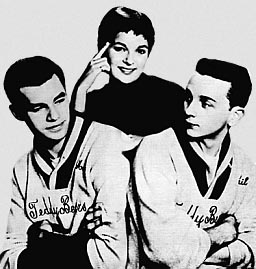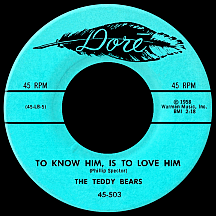THE TEDDY BEARS
To Know Him, is To Love Him
Fairfax High School student Phillip Harvey Spector spent many nights in his darkened bedroom during the mid-'50s, playing guitar and dreaming of...more specifically, plotting...how he was going to systematically conquer the world of rock and roll...or, at the very least, the enticing music-biz scene that was going on just a few dozen blocks away. His father had suffered from depression and committed suicide in 1949; a few years later his mother moved the family out of the Bronx, New York to Hollywood, California, geographically placing Phil a short bus ride from several recording studios located on Melrose Avenue, Vine Street and/or the Boulevards of Sunset and Santa Monica. Marshall Leib, a like-minded music fan, shared his ambition, though not necessarily his obsession with 19th-century classical composer Richard Wagner. The two close friends formed a band with a piano player, Michael Spencer, that didn't get very far and never even had a name. Phil and Marshall found themselves on the right track when they became two-thirds of a vocal group; fellow Fairfax student Annette Kleinbard possessed the soprano voice that took them to the top.
Phil had been spending a lot of time hanging around Hollywood's Gold Star studio, his desire to get involved making him quite a nuisance. Once he realized he could make a record for as little as 30 or 40 dollars, provided he showed up prepared to make the most of two hours, he hit up each of his singing partners for a sawbuck (among them a fourth member, bass singer Harvey Goldstein) and scheduled the session. An uptempo tune he'd written, "Don't You Worry My Little Pet," was recorded in May 1958 with Gold Star's Stan Ross engineering the rapid-fire Spector-produced recording featuring Phil's guitar work, hastily-done overdubs of other instruments and added, layered vocals of the group's crudely-executed (but strangely appealing) harmony vocals, accomplished by singing along to the song's first, or second, take. After two hours, he had a master tape of the finished song and an acetate dub.
Making a nuisance of himself once again, Phil took the disc around town...and actually convinced Herb Newman and Lew Bedell of Era Records to take the song; they leased the master from him for a miniscule fraction-of-two-pennies royalty rate. A brainstorming session between Phil, Marshall, Harvey and Annette resulted in the group's name, The Teddy Bears, inspired by Elvis's smash "(Let Me Be Your) Teddy Bear." A flip side was needed and of several suggested Spector-penned songs, Bedell liked the ballad "Wonderful Loveable You." Harvey had joined the Army Reserve and was scheduled for duty that summer. He wasn't part of the recording process (and, it turned out, was thrown under the bus by Phil when he returned...hey, a couple cents split three ways is better than four ways, right?). A trio from that point on, there was at least one future star present at some of the recording dates that followed: drummer Sandy Nelson (the following year he pounded away on his own hit, "Teen Beat") contributed to a few of the forthcoming Teddy Bears recordings.
Spector's "Loveable" lullaby didn't come out as well as expected, but another of his songs, "To Know Him, is To Love Him," was altogether different. The lyrics were inspired by the inscription on his father's headstone: "To know him was to love him." Combining heartfelt lyrics (the title expanded somewhat to '...know, know, know...' and '...love, love, love...') with a melody gently lifted from some classical sonata or another, Annette's delicately high vocal set the song apart from anything else hitting the charts at the time. Quickly done at the end of a session, it was sent out on Era's subsidiary label Dore in August '58 as the B side of "Little Pet," yet its destiny quickly became apparent; deejays preferred the ballad and Bedell refocused his promotional priority. Established hitmaker Cathy Carr rushed out a cover on Roulette and a version on Capitol appeared by Evelyn Kingsley with the Towers, but neither could compete with the unusual, airy and more teen-centric original. After a slow start, the single made a gradual move up the charts and landed at number one in December.
Lew Bedell and Phil came to an impasse regarding money, so Spector, well aware a binding contract hadn't been signed, cut a deal with another Lew, one Mr. Chudd, head of Imperial Records. Just the fact the T-Bears were on Fats Domino's label was a huge thrill (never mind that the Fat Man wasn't around and seldom left New Orleans). There was a nice perk, though: they got to work with Domino's regular drummer, Earl Palmer! Writer credit had shown Phillip Spector on both sides of the Dore disc; on Imperial he was "H.P. Spector." Interest was split between the two dreamy-slow sides of the early '59 Imperial debut, "I Don't Need You Anymore" and the more effective "Oh Why," and each separately rose no higher than the bottom ten of the Hot 100.

The Imperial contract contained a bonus for Phil: he was allowed to make recordings separate from Annette and Marshall, so he hired guitarists Ernie Freeman and Howard Roberts and cranked out a rocking little instrumental called "Bumbershoot," intended as an attempt at doing jazz in a rock and roll style. Released in the spring under the name Phil Harvey, it failed to chart. Later Teddy Bears records suffered in the same way. Bedell put out the previously rejected "Wonderful Loveable You" on Dore, backed with "Till You'll Be Mine," a mostly-instrumental tune (the entire lyrics consist of a repeated 'ooo-wa-doo-wa...') that sounds like a "Little Pet" outtake. Imperial released an album, The Teddy Bears Sing!, and two singles, "If You Only Knew (The Love I Have for You)" and "Don't Go Away," both in the same mold as "To Know Him" ("Seven Lonely Days," the markedly more energetic flip of the latter, should have been considered as an A side). Chudd cut his losses and dropped them towards the end of the year. By that time Olympia, Washington trio The Fleetwoods had taken the soft-rock idea (with two girls and a guy instead of vice-versa) and ridden it to the top of the charts...twice!
In September 1959, Annette Kleinbard's luck took a bad turn: she lost control of her new MG convertible while cruising on Mulholland Drive, ending up in a ditch with serious injuries. Her face was seriously scarred and a series of surgeries became necessary to reconstruct her features. The Teddy Bears were finished. Within weeks, Phil produced a new, similar group, The Spectors Three, for Lester Sill and Lee Hazlewood's Trey Records, distributed by Atlantic. Two singles were issued (the first had a copycat Fleetwoods sound) with different female leads: Ricki Page (who later became a prolific studio singer) and another Fairfax High acquaintance of Phil's with a familiar first name, Annette Merar (whom he later married...a wild, winding Spector story of its own). After the group bombed, Spector moved to New York, wormed his way in the door at Atlantic and worked for a short time with trendsetters Jerry Leiber and Mike Stoller. He later gained a position in Los Angeles at Liberty before finally heading up his own hitmaking Philles Records (partnering with Sill), where he spent six years committing his greatest recordings to vinyl.
Marshall Leib played briefly with a band called The Moondogs, then produced records for several years (his last name sometimes spelled "Lieb"); his best-known production was the 1963 hit by The Ribbons, "Ain't Gonna Kiss Ya." Annette had a late-'59 single on Imperial, the bouncy "Alibi" under the name Annette Bard; soon after she adopted the pseudonym Carol Connors (because that Funicello girl had ruined her own name!), eventually making the change legal. She had a few singles on Columbia in 1961 and '62 as well as one on Dunes as Carol Collins. As Connors she re-upped with Era Records for two '62 singles, then did one for Capitol. She joined the hot rod movement of the time, establishing herself as a songwriter with "Hey Little Cobra," co-penned with her brother, Marshall Kleinbard (who used the Connors surname).
Carol continued singing and made a promotional record for Yamaha bikes, "Yum Yum Yamaha," as Carol Connors and the Cycles, followed by "Go Go G.T.O." on Colpix with her sister, Cheryl Kleinbard, as Carol and Cheryl. A final Connors 45 popped up in '66 on Mira: "My Baby Looks, But He Don't Touch." Carol bounced back beautifully from her trying late-'50s period; writing songs has since served her well, with a few film scores thrown in for good measure. She received two Oscar nominations in the Best Song category: "Gonna Fly Now" (cowritten with Bill Conti and Ayn Robbins), the famous theme from the blockbuster 1976 movie Rocky (a number one hit she actually received label credit on!) and, a year later, "Someone's Waiting For You" (with Sammy Fain and Robbins) from Disney's animated The Rescuers. Later successes include the brilliant "With You I'm Born Again" (cowritten with David Shire), a 1980 hit by Billy Preston and Syreeta. And, of course, there are millions who still swoon over her innocently lovely vocal performance on that Spectorized musical milestone with an ill-placed comma in the title: "To Know Him, is To Love Him."


